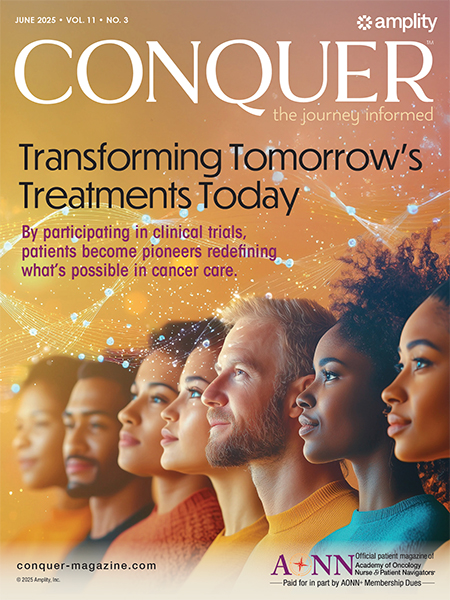Insights into Navigation
Navigation & Survivorship News published on January 24, 2024 in Insights into Navigation
Professional colleagues can become a constant and significant part of our daily routines. So how does this change if one of them is diagnosed with cancer? In this article, we offer some tips to help individuals support co-workers throughout cancer treatment.
Navigation & Survivorship News published on December 20, 2023 in Insights into Navigation
When diagnosed with cancer, one of the first things people worry about is their ability to work. The good news is that there are steps that your patients and their employers can take to strike a balance between cancer treatments and work responsibilities.
Lillie D. Shockney, RN, BS, MAS, HON-ONN-CG, Billie Lynn Allard, RN, MSN, FAAN, Jennifer Edwards, BSN, RN, OCN, LSSGB
Navigation & Survivorship News published on December 4, 2023 in Insights into Navigation
Two years ago, when faced with the tremendous need for a professional home for chronic and complex care nurse navigators, we took the plunge and founded the Association of Chronic & Complex Care Nurse Navigators (ACCCNN). That decision culminated in our inaugural ACCCNN Summit in November.
Navigation & Survivorship News published on October 25, 2023 in Insights into Navigation
Studies have shown that, when in a stressful situation, people retain as little as 10% of what they were told. Click below for tips on how to deliver compassionate and clear communication that will help patients process their diagnosis and make informed decisions about their care.
Navigation & Survivorship News published on September 20, 2023 in Insights into Navigation
Three vaccines are being recommended this year: COVID, flu, and RSV. Each vaccine has its own unique considerations that both navigators and patients should be familiar with. Read on for a breakdown of each vaccine along with tips on how navigators can set the best examples for their oncology patients.
Navigation & Survivorship News published on August 22, 2023 in Insights into Navigation
Every member of a patient’s treatment team hopes their patient is in a clean, safe environment that enables them to stay on treatment and promote general well-being. Unfortunately, this isn’t always the case. Home healthcare nurses can see things that patients didn’t reveal themselves—maybe they simply forgot to mention something, or they were embarrassed to do so. Read on to learn the value of partnering with home healthcare nurses to best address your patient’s unmet needs.
Navigation & Survivorship News published on July 26, 2023 in Insights into Navigation
The decisions our patients make about their treatment are deeply personal. They might select one treatment plan over another based on how they process information, their experiences with cancer, and their life goals. Lillie shares a few recent examples of the decisions her patients have made that are both in line with and against their treatment team’s suggestion.
Navigation & Survivorship News published on June 19, 2023 in Insights into Navigation
Summer is here! With warm weather comes an increase in outdoor activities. Because we know that more than 90% of skin cancers are caused by sun exposure, we need to be mindful of wearing sunblock and encourage our patients to do the same. Read on for points to bring up with your patients.
Navigation & Survivorship News published on May 30, 2023 in Insights into Navigation
Navigators caring for cancer patients know that cancer doesn’t just affect patients’ bodies, but also their minds. Navigators can only help ensure patients receive the support they need if they know their patients are struggling. In this month’s Insights into Navigation, Lillie provides some tips on how to determine the mental health status, potential needs, and supports for both patients and their caregivers.
Navigation & Survivorship News published on April 27, 2023 in Insights into Navigation
We all know that screening tests can detect some cancers early (when treatment works best), but do our patients know that? We can help educate our patients on the importance of early cancer detection and where they should inquire for screenings related to women’s health, head and neck cancer, skin cancer, colorectal cancer, and prostate cancer.
Page 1 of 21
Results 1 - 10 of 204
Results 1 - 10 of 204
Thank You to Our Corporate Sponsors and Alliance Partners!

Major Corporate Sponsor

Patron Corporate Sponsor

Patron Corporate Sponsor

Patron Corporate Sponsor

Industry Relations
Council Member

Industry Relations
Council Member

Industry Relations
Council Member

National Alliance Partner

National Alliance Partner

National Alliance Partner

National Alliance Partner

National Alliance Partner

National Alliance Partner
Privacy Notice | Terms of Use
© 2009- DBA AONN+ Academy of Oncology Nurse & Patient Navigators® | PO Box 357387, Gainesville, FL 32635-7387 |
AONN+ DBA AONN+ is a 501(c)(6) organization under federal tax guidelines. AONN+ Foundation for Learning, Inc. a 501(c)(3) organization under federal tax guidelines.
AONN+ Advantage, LLC, a wholly owned subsidiary of AONN+.


